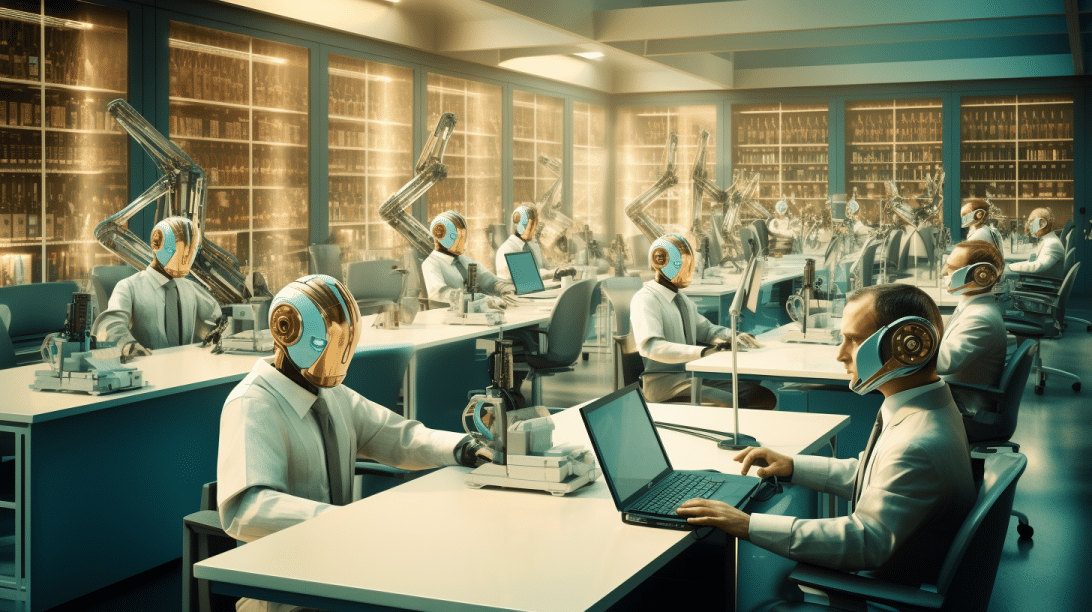Photo was created by Webthat using MidJourney
In a dynamic world driven by technology, the MIT Schwarzman College of Computing is taking a visionary leap by awarding seed grants to seven groundbreaking interdisciplinary projects. These projects are dedicated to the exploration of AI-augmented management, paving the way for a new era of workplace productivity and enhanced human-computer interaction.
Exploring the Synergy: AI and Modern Workspaces
The intersection of artificial intelligence and management is a realm of boundless potential. With the generous support of Andrew W. Houston ’05 and Dropbox Inc., MIT has embarked on a journey to unlock this potential through seven pioneering projects that embrace the convergence of computing, social sciences, and management.
Related Reading: AI in the Workplace: Promises and Pitfalls
Enhancing Efficiency and Management
- Memory Prosthetics through AI: LLMex Project
Lead Researchers: Patti Maes and David Karger
The LLMex project draws inspiration from Vannevar Bush’s Memex, envisioning memory prosthetics using large language models (LLMs). This innovation aims to intelligently assist individuals in managing copious amounts of information, accelerating workplace productivity, and minimizing errors. With automated recording of work actions and proactive suggestions based on context, the AI-based system empowers users to stay on top of their tasks. - Predictive Simulations with AI Agents
Lead Researchers: John Horton and Jacob Andreas
The MIT Sloan School of Management and EECS are collaborating to simulate social scenarios through AI agents. The fusion of modern LLM capabilities with organizational simulations facilitates accurate predictions and informed decision-making. This transformative approach could revolutionize policy implementation and communication tools. - AI and Human Expertise: A Complementary Partnership
Lead Researchers: Manish Raghavan and Devavrat Shah
MIT Sloan and EECS are spearheading research that seeks harmony between AI and human expertise. The project envisions a future where AI-enhanced decision aids complement human professionals, bridging the gap between algorithmic assistance and domain knowledge.
Related Reading: AI’s Ambiguous Impact: A Mixed Bag of Challenges and Promise in the Workplace
Innovations in Healthcare and Education
- Revolutionizing US Hospitals with Generative AI
Lead Researchers: Julie Shah, Retsef Levi, Kate Kellog, and Ben Armstrong
A multidisciplinary team aims to alleviate administrative burdens on healthcare professionals using generative AI. By optimizing productivity and enhancing job quality, this project strives to create a holistic framework that benefits both healthcare organizations and their dedicated workers. - Democratizing Programming through Generative AI
Lead Researchers: Harold Abelson, Cynthia Breazeal, and Eric Klopfer
The landscape of software creation is undergoing a seismic shift thanks to generative AI. This project, led by luminaries from EECS, CSAIL, and the Media Lab, aims to democratize programming by developing software tools that empower learners without prior technical training to craft applications without grappling with complex code.
Related Reading: Lessons Learned from the CBI Scandal: Prioritizing Workplace Safety and Respect
Unraveling AI’s Impact on Society
- AI’s Influence on Skill Acquisition and Productivity
Lead Researchers: David Atkin, Martin Beraja, and Danielle Li
A team from the Department of Economics and MIT Sloan is delving into the implications of AI on skill acquisition and workplace productivity. As generative AI transforms cognitive tasks, this project seeks to understand how society can harness these advancements to maximize overall gains. - Augmented Onboarding and Support with AI
Lead Researchers: Tim Kraska and Christoph Paus
LLMs have brought learning to new heights, yet hurdles remain in utilizing these resources effectively. This project introduces LLM-powered onboarding and support systems, revolutionizing user experiences and support team operations.
Related Reading: The Need for Stricter Oversight of AI in the Workplace
Navigating a Bright Future
The MIT Schwarzman College of Computing’s visionary approach in awarding these seed grants underscores a commitment to a future where artificial intelligence not only augments human capabilities but also transforms how we manage, collaborate, and innovate. By seamlessly integrating AI into modern workspaces, these projects are setting the stage for a more workplace productivity and efficient world.


